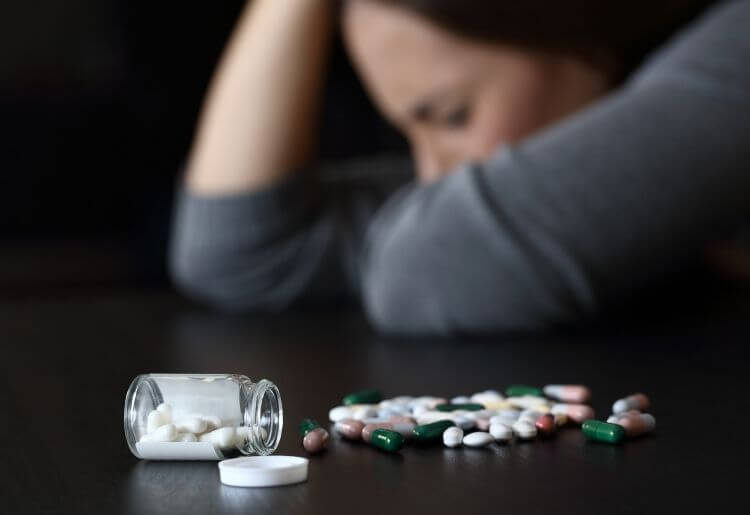But there is hope for recovery, with many resources available for treatment including group support, therapy (in person or online), and medical intervention. In this article, we explain what addiction is and how it is treated so that you can take the next steps you think necessary.
What Is Addiction?
Addiction refers to the compulsive, repeated use of a drug or engagement in a behavior despite it having a significant, negative impact on your life. It may involve the use of substances such as alcohol, nicotine, illegal drugs, prescription medicine, or activities such as games, food, gambling, shopping, and even Internet use.
If you look at the research on the neurobiology of addiction, you’ll see that it’s a complex disease with many stages and not simply a substance or behavior you enjoy. The brain’s neurocircuitry is impacted, changing the way it functions. Studies show that addiction stimulates the reward center of the brain while damaging the decision center. Risk factors for addiction can include genetics, environment, trauma, and even age. Teenagers are particularly vulnerable because their brains are still developing and their pleasure center is more easily activated.
Addictions have far-reaching consequences. The harmful effects can be felt in jobs, relationships, finances, and even overall health. You may even recognize yourself or someone you know. Instead of feeling discomfort or shame, remember that addictions are treatable illnesses. Let’s take a look at 10 of the most common types of addictions and how they are treated.
1. Alcohol Addiction
Alcohol addiction can be defined as overuse that has a harmful effect on one’s life. Alcoholism can take the form of daily drinking or binge drinking, and many alcoholics can be highly functional in their everyday lives. Functional alcoholics are more likely to stay in denial about their addiction as their alcohol use may not impact their productivity as significantly as it does that of other problem drinkers.
According to the World Health Organization, alcohol use contributes to the death of 3 million people a year. Treatment options include behavioral and talk therapy, which can be received through providers such as Talkspace. Addiction can also be treated by rehabilitation centers, prescribed medications aimed at reducing or eliminating drinking, and 12-step support groups like Alcoholics Anonymous. Support for addiction can include self-help books, motivation apps, and other resources.
2. Nicotine Addiction
Nicotine addiction can be defined as an inability to quit using nicotine products, with withdrawal symptoms resulting when you do try to stop. It can come with strong cravings, and many users may find themselves opting out of social situations where smoking is prohibited.
Nicotine is harmful to the heart and lungs of users and to the adults and children who are exposed to it secondhand. The Center for Disease Control reports that secondhand smoke can contribute to infant death during pregnancy and has been linked to many harmful illnesses in children including asthma, ear infections, Sudden Infant Death Syndrome (SIDS), and respiratory infections.
Nicotine has many available treatments. Cognitive-behavioral treatments and mindfulness practices have both proven helpful in treating dependence on nicotine, while others find prescribed medications, such as patches and gums, to be of benefit.
3. Sex Behavior Addiction
Sexual addiction may be referred to as compulsive sexual behavior disorder or out-of-control sexual behavior. It’s defined as having repeated, intrusive sexual fantasies accompanied by poor impulse control. The compulsion defines the disorder, not the number of sexual partners or frequency of sexual activity. It can manifest as pornography addiction, frequent masturbation, and high-risk sexual behaviors.
Practicing self-care and ways to handle stress is essential to recovering from an addiction. Sex addiction is often accompanied by shame, and it’s important to take care of your emotional health during recovery. Other treatment includes support groups, in-person or online therapy, online trauma therapy services, and rehabilitation centers.
4. Illegal Drug Addiction
Illegal drug addiction is commonly associated with the use of prohibited drugs such as cocaine, heroin, methamphetamines, and (outside of legally designated areas) marijuana, but it also includes taking someone else’s prescribed medication. The risks include health problems, employment issues, financial distress, incarceration, and even death from overdose.
Treatment programs exist for drug addicts, but they’re heavily stigmatized. They include long- and short-term residential rehabilitation centers, outpatient treatment centers, and even criminal justice treatment interventions where addicts receive rehabilitative treatment instead of incarceration.
Other treatment options include medically assisted detoxification, behavioral therapy with a licensed therapist, and support groups such as Narcotics Anonymous. Social support, mental health resources, and a treatment plan are essential to drug addiction recovery.
5. Prescribed Drug Addiction
The chemicals in some prescribed drugs are addictive. Simply taking a prescribed narcotic to relieve pain does not make you an addict. However, if you find yourself compulsively taking your medication and having withdrawal when you try to stop, you might have formed an addiction.
Treatments are available to anyone who has become addicted to their medication. Online therapy, such as OnlineTherapy.com, is one treatment option but there are also medications that can help, such as methadone for opiate addiction. Other treatments include emotional support groups or 12-step groups like Alcoholics Anonymous (AA), Narcotics Anonymous (NA).

6. Video Game Addiction
Gaming addiction can involve overspending on games and gaming systems, prioritizing gaming over relationships and other responsibilities, lying about the frequency of your gaming, neglecting nutrition and hygiene while playing, and experiencing anger if interrupted. This addiction could negatively impact your job, relationships, and finances.
Cognitive-behavioral therapy is one of the most recommended treatment modalities, with online therapeutic options available for children or teenagers. Group or family therapy could also offer support. Medication could even be prescribed for anyone whose gaming addiction involves a concurrent diagnosis of depression or anxiety.
7. Food Addiction
Food addiction is a behavioral addiction that features a lack of impulse control when it comes to eating processed junk food like candy, soda, and salty food. This addiction comes with a strong, uncontrollable desire for the food, overindulging, and then experiencing guilt for eating it. It may even involve hiding these binges from others.
Food addicts can be at risk for excessive weight gain, Type 2 diabetes, and even illnesses that could shorten their lifespan. Treatments for food addiction include mental health counseling and attending support groups. A nutritionist can also help support your health and recovery, and a primary care physician can check for any potential health risks caused by the addiction.
8. Gambling Addiction
Gambling can take many forms, from playing in online casinos to buying lottery tickets to betting on sporting events. When it crosses over into an addiction, it can be very difficult to overcome as gambling activates the reward center of the brain at a level 10 times higher than normal. Individuals with gambling addiction often put their finances, families, and lifestyle at risk with their behavior. In extreme cases, their addiction can lead to a life of crime as they’re tempted to steal to play or cheat to win.
Gambling addiction can be treated with cognitive-behavioral therapy, gambling support groups, and even inpatient treatment programs. You can also participate in couples counseling, financial counseling, career counseling, and credit counseling while recovering from a gambling addiction.
9. Shopping Addiction
Shopping addiction looks like compulsive shopping and may occur as a result of emotional distress. Shopping addicts can look like any of the following: trophy shoppers who won’t stop until they find the perfect item, thrift shoppers who buy items they don’t need simply because they’re on sale, collectors who are always accumulating to add to their collection, big spenders who buy items that may confer a sense of heightened social status, and binge shoppers who impulsively buy and then later return items.
Shopping addiction can hurt your relationships, your finances, and even your mental health. Treatment options mirror the treatment for other addictions, and support can be found in group therapy and cognitive behavioral therapy. Consulting a financial specialist can also help you work on your relationship with money as you recover from your addiction.
10. Internet Addiction
Even though internet addiction disorder isn’t yet recognized in the Diagnostic and Statistical Manual of Mental Disorders (DSM), it is becoming more common. Internet addiction is characterized by compulsive and pathological internet use. It can involve lying about your use and spending so much time online that you put your jobs, health, and relationships at risk.
Treatment options can include cognitive-behavioral therapy, support groups, and even some pharmacology options such as antidepressants. Some studies even suggest that exercise can act as an intervention.
Conclusion
Society often has compassion for diseases of the body, and yet addicts are often subject to judgment rather than empathy for their illness. For many, the stigma surrounding addiction can be a barrier to acknowledging the disease and seeking treatment. Addictions are diseases that impact neurobiology and can devastate the lives of those who suffer from them.
Recovery is possible, and resources to help you on the journey are plentiful. If you’ve seen yourself in one of these addictions, you’ve taken the first step towards changing your life. Don’t stop now. Help could be a click away.
